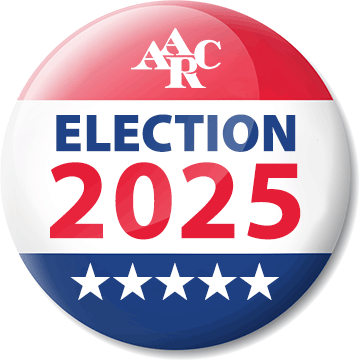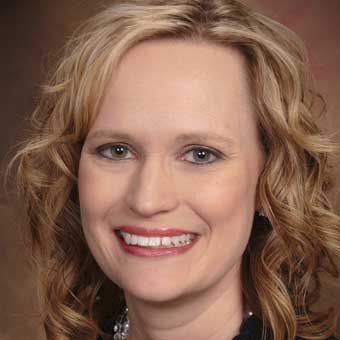Vice-President — External
Jennifer Anderson
Associate Professor, Program Chair, Interim Graduate Coordinator of MHA program
Midwestern State University
AARC Member Since: 2001

AARC Activities:
- AARC Education Section Chair 2023 – present
- AARC Education Summit Co Chair 2024 – present
- AARC Education Section Chair 2021 2023
- AARC Education Section Chair-Elect 2020 2021
- Member of Board of Directors 2021- 2023, 2023 – present
- AARC Election Committee 2021
- BOD liaison to CoBGRTE 2022-2024
- BOD liaison to American College of Respiratory Therapy Education (ACRTE) 2024- present
- Leadership Grand Round Committee
- Standard 1.01 Task Force Co Chair 2021-2022
- AARC Membership Committee Chair 2019-2020
- AARC Finance Committee Member 2019-2020
- AARC Audit Sub Committee Member 2019-2020
- AARC Education Section Member 2007-Present
- Member of all the AARC Sections 2023 – present
- AARC Fellow 2023
HOD Activities:
- House of Delegate HOD Officer Treasurer 2019 2021
- Texas Society of Respiratory Care Delegate 2014-2018
- Co Chair House of Delegates Volunteer and Mentoring Committee 2016-2018
- House of Delegates Volunteer and Mentoring Committee 2014-2016
- House of Delegates Strategic Objective 4 Committee 2016-2019
Affiliate Activities:
- Texas Society of Respiratory Care Delegate 2014-2018
- Political Action Contact Team PACT Advocacy Representative 2014 – 2018
- President of North Texas Region 2013-2014
- Election Committee Chair 2016
- Program Committee Co Chair 2014
- Program Committee 2014-2018
- Student Mentor Chair 2015 2018
- Bylaws and Judicial Committee Member 2016-2018
- Executive Office Task Force Committee Chair 2014
Related Organizations:
- American College of Respiratory Therapy Education (ACRTE)
- The Coalition of Baccalaureate and Graduate Respiratory Therapy Education CoBGRTE
- CoBGRTE Board of Directors 2014-2018
- CoBGRTE Secretary 2017-2018
- Texas Association of Schools of Allied Health Professions member 2014-present
- Lambda Beta Society MSU Faculty Member 2007-present
Education:
- EdD University of North Texas Denton Texas 2014
- M.A Texas Woman’s University Denton, Texas 2007
- BSRC, Midwestern State University, Wichita Falls, Texas 2001
- RRT, RRT – NPS
Publications:
- Refereed Journals
- Clark K, Gresham-Anderson, J.(2023) Evidence-Based Practice Teaching Strategies and Resources Needs Assessment. Respiratory Care, (68), Suppl 10.
- Gresham – Anderson, J., Case, R. (2022). Secrets of success: The ultimate guide to educational recruiting and marketing strategies. AARC Advanced Leadership Institute – Education Track: Chapter 6 – Recruitment, https://my.aarc.org/Education/My-Programs/Course-Detail?pa_courseid=%7B0916A02D-CEAB-EC11-80F9-000D3A0EE4ED%7D
- Helton, P. R., Gresham–Anderson J., (2021). Undergraduate Health Science Education during a Pandemic: Perceptions and Experiences of Respiratory Care Students. Respiratory Care Education Annual, (30), 38-46
- Gresham – Anderson J., Rojas J., Kemp L., (2021). Respiratory Therapy Department Credentialing and Educational Level Impact on Patient Outcomes: A Pilot Study. Respiratory Care Education Annual (30), 4-13
- Gresham – Anderson J., Williamson K., Ayinagadda S., (2020). An Interprofessional Approach to Teaching Evidence–Based Practice. Internet Journal of Allied Health Sciences and Practice, (18), Article 2
- Gresham-Anderson J., Kurszewski T., Davenport E, Flagg S., Coonce M., (2019). Exploring Death Coping Strategies of Respiratory Therapists Who Work in Neonatal Intensive Care Units: A Pilot Study. Respiratory Care Education Annual, (28), 36-43
- Helton, P. R., Gresham–Anderson J. (2017). Life Satisfaction: A Mixed – Method Study of Recent Respiratory Care Graduates, Respiratory Care Education Annual, (26), 31-38.
- Gresham-Anderson J. (2015). The Transition Experience of Therapist to Educator, Respiratory Care Education Annual, (23), 28-36.
- Gresham, J. (2014) The Transition Experience of Second Career Respiratory Faculty: A Phenomenological Study (3691155). [Doctoral Dissertation, University of North Texas]. ProQuest Dissertations Publishing.
- Killion, J. B., Johnston, J. N., Gresham, J., Gipson, M., Vealé, B. L., Behrens, P. I., … & Close, D. M. (2014). Smart Device Use and Burnout Among Health Science Educators. Radiologic technology, 86(2), 144-154.
- Gresham, J., Bowles, B., Gibson, M., Robinson, K., Farris, M., & Felts, J. (2012) Death-planning for the inevitable: a hybrid honors course. Honors In Practice, (8), 43-54.
- Professional Articles: Anderson, J, (2024).Respiratory Therapy. Link for College Counselors, LINK For Counselors : Spring 2024 (e-ditionsbyfry.com)
- Gresham – Anderson J, (2021). A Little Less Drama: Conflict Resolution Tools. American Association for Respiratory Care, Newsroom, https://www.aarc.org/an21-a-little-less-drama-conflict-resolution-tools/
- Grants:
- External Grant, 2018
- AARC Vision Grant, The Impact of Respiratory Care Education Levels on 30d COPD Readmission Rates. Total Funding Amount $25, 868
Elections Committee Questions:
What do you see as the biggest challenge facing the AARC, and what do you recommend to address it?
The biggest challenge facing the American Association of Respiratory Care (AARC) continues to be the lack of understanding and recognition of the value of respiratory therapists and the profession as a whole. Addressing this challenge is crucial to the growth and success of the AARC. To tackle this challenge, I recommend that the AARC continue to collaborate with other essential organizations, such as HOSA, NAP, and AHEC, to promote the profession, address recruitment and retention issues, and provide leadership opportunities. The AARC must also continue to work on advancement opportunities in the profession, such as APRT. The APRT summit and many volunteer committee members have made great strides towards this. The AARC needs to continue the momentum towards these efforts and get the word out about the progress. Additionally, the organization must focus on demonstrating the value of being a member of the AARC by highlighting the benefits and opportunities available to members. Furthermore, it is essential to celebrate and reward both the small and big wins to boost morale and encourage participation. Too often, hard work goes unnoticed and unrecognized. By doing so, the AARC can continue to build a strong and supportive community of respiratory therapists who are passionate about their work and committed to advancing the profession. In conclusion, I firmly believe that by working together and implementing these recommendations, we can overcome the challenges facing the AARC and ensure that respiratory therapists receive the recognition and support that they deserve.
Healthcare is changing more rapidly than ever. What ideas do you have to help today’s respiratory therapist meet these changes?
The healthcare industry is experiencing rapid changes, and it’s crucial to equip respiratory therapists with the latest tools and technologies to meet these challenges. There are shortages in respiratory equipment and other resources, and as a profession, we need to explore how AI-powered systems can assist respiratory therapists in providing the best possible care to patients. To stay up-to-date with the latest advancements, respiratory therapists should have access to comprehensive training programs and continuing education opportunities. Educators, hospital-based educators, and leaders must receive ongoing training to help their teams and students stay informed. Leadership training is also critical. We must train leaders and future leaders how to make data-driven decisions and advocate for patients and the profession. Moreover, respiratory therapists should receive fair compensation and recognition for their work. The AARC should continue to provide and improve the evidence-based support they need to overcome the challenges facing our healthcare system and deliver the best possible care to patients.
Share your thoughts about how you can encourage the AARC Committees, Specialty Sections, and Special Representatives to contribute to the strategic plan for the AARC. How do you see your role in this process?
As Vice President Internal Affairs, I believe it is crucial to actively engage with the AARC Committees, Specialty Sections, and Special Representatives to encourage their involvement in the strategic planning process. One way to accomplish this is to establish open lines of communication and build relationships with these groups, understanding their unique perspectives and priorities. By fostering a collaborative environment where all stakeholders are encouraged to share their ideas and feedback, we can ensure that the strategic plan reflects the diverse needs and perspectives of the AARC membership. As part of this process, I would seek to provide ongoing education and training opportunities to these groups so they feel empowered and equipped to contribute to the strategic plan. Ultimately, my role in this process is to serve as a facilitator, bringing together the various groups and coordinating their efforts to ensure that the strategic plan is aligned with the overall mission and vision of the AARC. I would work closely with the President and other members of the Executive Committee to review and refine the strategic plan, incorporating feedback from these groups as appropriate.





